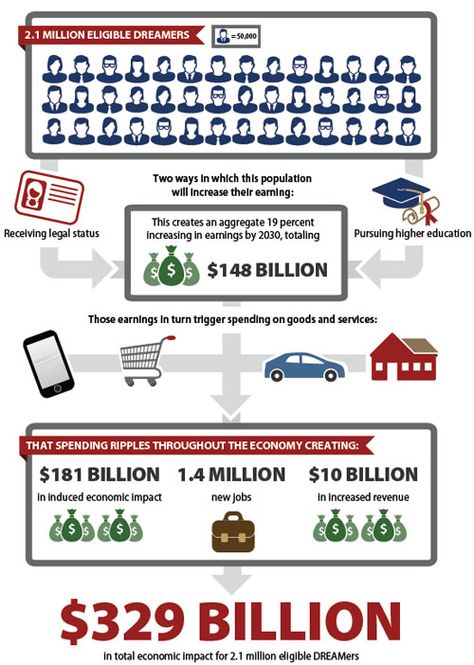If you had to choose between having $2 and $20, you’d choose $20, right? This is because logically and economically speaking, having more money is beneficial. More money equivalents to more assets which can lead to an overall improvement of the standard of living.
Eliminating the DACA is an economic mistake. It is a costly decision because according to the CATO institute, it would cost the government at least $60 billion to deport all DACA recipients. Not only this, economic researchers have estimated that the elimination of the DACA is likely to result in a $400 billion economic loss. Ultimately this will lead to a decrease in GDP. For those of you who aren’t economically savvy, GDP stands for gross domestic product and it is a measurement of a nation’s economic standing. A decrease in GDP can lead to higher unemployment rates and can even cause an economic recession.
Logically speaking, the nation should strive to increase economic prosperity. I propose that we do so through the DREAM Act. To put it simply, there are three major ways the DREAM Act will benefit the U.S. economy:
- It will create jobs. A report sponsored by the Partnership for a New American Economy estimates that the DREAM Act will create 1.4 million jobs. An increase in jobs ultimately helps the economy because it alleviates the poor’s financial burden and decreases the unemployment rate.
- It will lead to an increase in earnings. By granting citizenship to an estimated 2.1 million people, the nation’s overall earnings would increase by about $148 billion. This is good because it increases the overall standard of living.
- It will increase the nation’s GDP. Using a model developed by American Community Survey data from 2006-2010, researcher Jua
 n Carols Guzman concluded that the DREAM Act could potentially add $329 billion to the American economy. Additionally, there would be an increase in college-educated Americans which correlates with an increase in GDP.
n Carols Guzman concluded that the DREAM Act could potentially add $329 billion to the American economy. Additionally, there would be an increase in college-educated Americans which correlates with an increase in GDP.
Not only will the DREAM Act help the nation’s overall economic situation, it will also help the U.S. government’s financial situation. It will do so through an increase in tax revenue. If the estimated 2.1 million people become legal working citizens, a portion of their income will go to the government in the form of taxes. To be specific, total tax revenue would increase by at least $10.2 billion.
Despite these findings, some Americans still have some misconceptions regarding the economic impact of the DREAM Act. People often claim the legislation would be “too expensive.” In reality, the DREAM Act would generate $1.4 billion more than it costs. Also, DREAM Act applicants would be responsible for paying the fees related to their application processing. Essentially, the idea that the DREAM Act is too expensive is WRONG, as Donald Trump would say.
In my educated opinion, I believe Trump’s decision is WRONG. He ignorantly made the mistake of eliminating a great program, the DACA. Now, he is ignorantly making the mistake of not backing the DREAM Act, because as we can all see, it’s the economically savvy decision.
